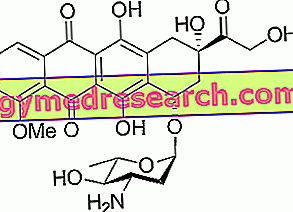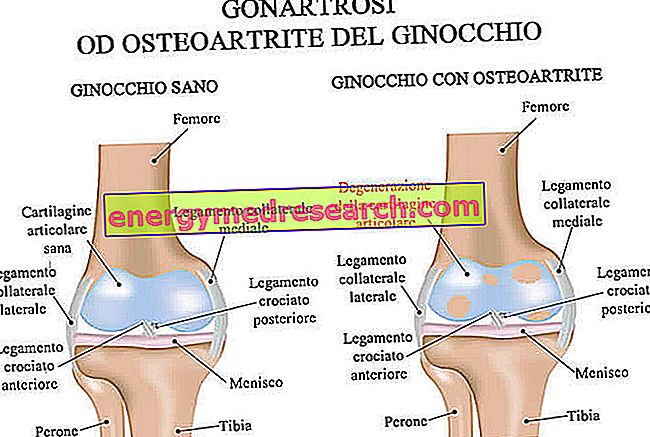Epirubicin is an anthracycline antibiotic used in antineoplastic chemotherapy for the treatment of various cancers.
Indications
For what it uses

Epirubicin - Chemical Structure
Epirubicin is used - alone or in combination with other drugs - to treat:
- Breast cancer;
- Lung cancer;
- Stomach cancer;
- Liver cancer;
- Pancreatic cancer;
- Bladder cancer;
- Colorectal cancer;
- Ovarian cancer;
- Lymphomas;
- Soft tissue sarcomas.
In addition, epirubicin can be used in post-operative therapy following surgical removal of the tumor.
Warnings
The administration of epirubicin must take place under the strict control of a doctor who specializes in the administration of powerful anticancer agents.
It is important that patients treated with epirubicin recover from the toxicity induced by it before taking the next drug dose.
Due to epirubicin-induced cardiotoxicity, patients' cardiac function must be carefully monitored, both before and during treatment with the drug.
Therefore, great caution should be used in the administration of epirubicin in patients at high risk of heart disease.
During epirubicin therapy, the liver and kidney function of patients should be kept under close supervision, both during the treatment and for a certain period of time from the end of the treatment.
Interactions
Epirubicin-induced heart toxicity may be increased by concomitant - or just prior - administration of other anticancer drugs, including:
- Mitomycin ;
- Dacarbazine ;
- Dactinomycin ;
- Cyclophosphamide ;
- 5-fluorouracil ;
- Cisplatin ;
- Taxani ;
- Trastuzumab .
Furthermore, the cardiotoxicity of epirubicin can be increased if administered simultaneously with radiation therapy .
If epirubicin is administered concomitantly with barbiturates or rifampicin (an antibiotic used to treat tuberculosis), there may be a decrease in the plasma concentration of epirubicin itself, which causes a reduction in its therapeutic efficacy.
Close administration of epirubicin with paclitaxel and docetaxel (anticancer drugs) may result in an increase in epirubicin in the blood, causing an increase in side effects.
The administration of cimetidine (a drug used to treat gastric ulcer) may also increase the plasma concentration of epirubicin, causing an increase in adverse effects.
The myelotoxicity (toxicity of the bone marrow) of epirubicin may be increased by concomitant medication, such as:
- Other anticancer drugs ;
- sulfa drugs (antibacterial drugs);
- Chloramphenicol (an antibiotic);
- Diphenylhydantoin (also known as phenytoin, an anti-epileptic drug);
- Derivatives of amidopirina (a non-steroidal anti-inflammatory drug).
The suppression of the immune system induced by epirubicin can be increased by the concomitant administration of ciclosporin (a drug with immunosuppressive action used in the prevention of rejection in transplants).
Epirubicin and the following drugs may interfere with each other when they are given concomitantly:
- Dexverapamil, a drug used to treat certain heart conditions;
- Quinine, a natural alkaloid having analgesic, antipyretic and antimalarial properties;
- Interferon α-2b, used to treat some types of cancer and some forms of hepatitis.
Side effects
Epirubicin causes many side effects, some of which are very serious. Many of the drug-induced adverse effects are dose-dependent. However, it is said that the side effects do not occur all with the same intensity in each individual patient, this is because there is a great variability of response to chemotherapy between one individual and another.
Myelosuppression
Treatment with epirubicin may cause severe myelosuppression. This suppression leads to a reduction in the production of blood cells (reduced hematopoiesis) which can lead to:
- Anemia (decrease in hemoglobin blood levels), the main symptom of the onset of anemia is the feeling of physical exhaustion ;
- Leukopenia (decreased white blood cell levels), with increased susceptibility to contraction of infections ;
- Plateletopenia (decrease in the number of platelets), this leads to the appearance of bruising and abnormal bleeding with an increased risk of bleeding .
Allergic reactions
Epirubicin can cause severe allergic reactions in sensitive individuals. Rashes, itching, fever, chills, anaphylactoid reaction and anaphylactic shock may occur.
Nervous system disorders
Treatment with epirubicin may cause headaches and dizziness and may favor the appearance of peripheral neuropathies (diseases that affect the peripheral nervous system).
Eye disorders
Epirubicin therapy can cause eye disorders, including conjunctivitis and keratitis .
Cardiac toxicity
Treatment with epirubicin may cause severe cardiotoxicity, both acute (ie immediate) and delayed. It is a dose-dependent side effect. Epirubicin-induced cardiac toxicity may cause:
- Sinus tachycardia;
- Premature ventricular contractions;
- bradycardia;
- Atrioventricular block;
- Branch block;
- Congestive heart failure (or ICC), characterized by dyspnea and / or edema;
- Abnormal heart rhythm (gallop rhythm);
- Cardiomyopathies (myocardial pathologies).
The cardiotoxicity of epirubicin may be increased by concomitant administration of radiotherapy, other anthracyclines or drugs that decrease the force of contraction of the heart.
Carcinogenicity
Epirubicin may cause acute lymphocytic leukemia and secondary acute myeloid leukemia . The risk of developing these tumors increases if epirubicin is given at the same time as other anthracyclines and / or radiation therapy.
Vascular pathologies
Administration of epirubicin may cause phlebitis, thrombophlebitis and / or pulmonary thromboembolism .
Gastrointestinal disorders
Treatment with epirubicin may cause mucositis, esophagitis and stomatitis . Nausea, vomiting and diarrhea with consequent dehydration may also occur. Vomiting can be controlled by the use of anti-emetic drugs (antivomit), while diarrhea can be treated with anti-diarrheal drugs. However it is good to drink a lot to replenish lost fluids.
Furthermore, epirubicin can cause loss of appetite and anorexia .
Oral cavity disorders
Following the use of epirubicin, small ulcers of the oral cavity, pain and burning of the oral mucosa, bleeding and buccal pigmentation may occur.
Skin disorders
Epirubicin can cause skin rashes, hives, redness, itching, hyperpigmentation of skin and nails and photosensitivity (sensitivity of the skin to light).
Alopecia
Epirubicin therapy can cause hair loss. It is a dose-dependent but reversible side effect. The hair should begin to grow back soon after the treatment ends.
Renal disorders
Treatment with epirubicin may cause various kidney disorders including:
- Renal infections;
- Bleeding;
- Red urine staining;
- Burning sensation;
- Increased frequency of urination;
- Hyperuricemia (increased blood values of uric acid);
- Proteinuria (high levels of protein in the urine).
Infertility
Epirubicin therapy may cause amenorrhea (ie lack of menstrual cycle) in women and azoospermia (ie sperm-free sperm) in men.
Other side effects
Other side effects that may occur following the use of epirubicin are:
- Hot flashes;
- Temperature;
- Chills;
- Malaise;
- Weakness;
- Redness at the infusion site;
- Increased blood levels of transaminases;
- Severe cellulite;
- Tissue necrosis;
- Phlebosclerosis (thickening and hardening of the venous walls), this is manifested in case of accidental injection out of the vein.
Overdose
There is no antidote for epirubicin overdose. If you suspect you have overdosed, it is essential to inform your doctor immediately.
Action mechanism
Epirubicin is able to perform its cytotoxic (cell toxic) action through two mechanisms:
- It is able to interlace within the double strand of DNA. In this way, a DNA-drug complex is formed that inhibits cell division. However, this mechanism - alone - is not enough to kill the cancer cell;
- It is able to inhibit topoisomerase type II. This enzyme has the ability to cut and weld the two strands that make up DNA and plays a key role in the cell replication process. Once the enzyme is inhibited, the cell is no longer able to divide and undergoes the mechanism of programmed cell death called apoptosis .
Mode of Use - Posology
Epirubicin is available for intravenous and intravesical administration. It appears as a red colored solution, ready to be injected.
The administration can take place through three ways:
- Through a cannula (a thin tube) that is inserted into a vein of an arm or hand;
- Through a central venous catheter that is inserted subcutaneously into a vein near the clavicle;
- Through the PICC line ( Peripherally Inserted Central Catheter ), in this case, the catheter is inserted into a peripheral vein, usually of an arm. This technique is used for the administration of anticancer drugs for a prolonged time.
Intravesical administration, on the other hand, occurs by direct instillation into the bladder.
The dosage of epirubicin must be established by the doctor according to the type of tumor that is intended to be treated, based on the route of administration chosen and according to the patient's condition and clinical picture.
The dose of epirubicin usually used for intravenous administration can range from 60 to 120 mg / m2 of body surface area.
For intravesical administration, on the other hand, the dose usually used is 30-50 mg of epirubicin diluted in physiological solution or in sterile water for injections.
Since excretion of epirubicin occurs predominantly via the bile duct, dose adjustment may be necessary in patients with hepatic dysfunction.
Even patients with severe renal insufficiency may need a reduction in the dose of the drug administered.
Pregnancy and breastfeeding
Studies in animals have shown that epirubicin can cause fetal harm and deformity. For this reason, the use of the drug during pregnancy should be avoided, except in the case where the doctor does not consider it absolutely essential.
Furthermore, precautions must be taken - by both sexes - to avoid possible pregnancies, both during the treatment and for a period of at least six months from the end of the same.
Breast-feeding mothers should not take epirubicin.
Contraindications
The use of epirubicin is contraindicated in the following cases:
- Known hypersensitivity to epirubicin or other anthracyclines;
- In case of pre-existing cardiac pathologies;
- In case of severe hepatic impairment;
- In the presence of severe systemic, urinary and / or bladder infections;
- Pregnant;
- During breastfeeding.



